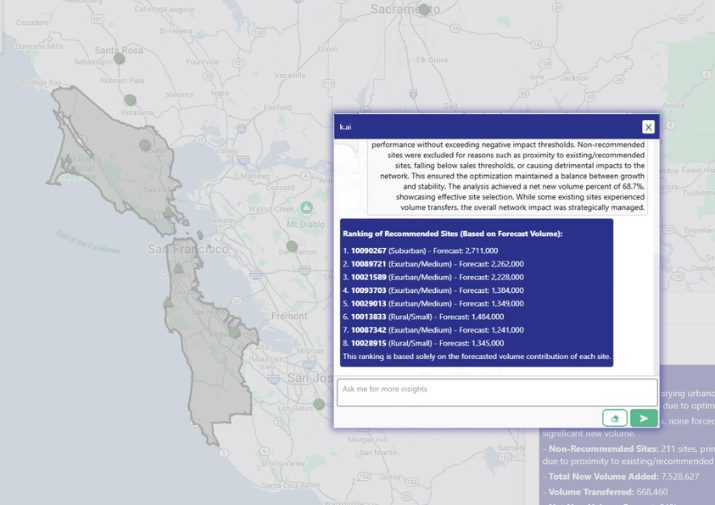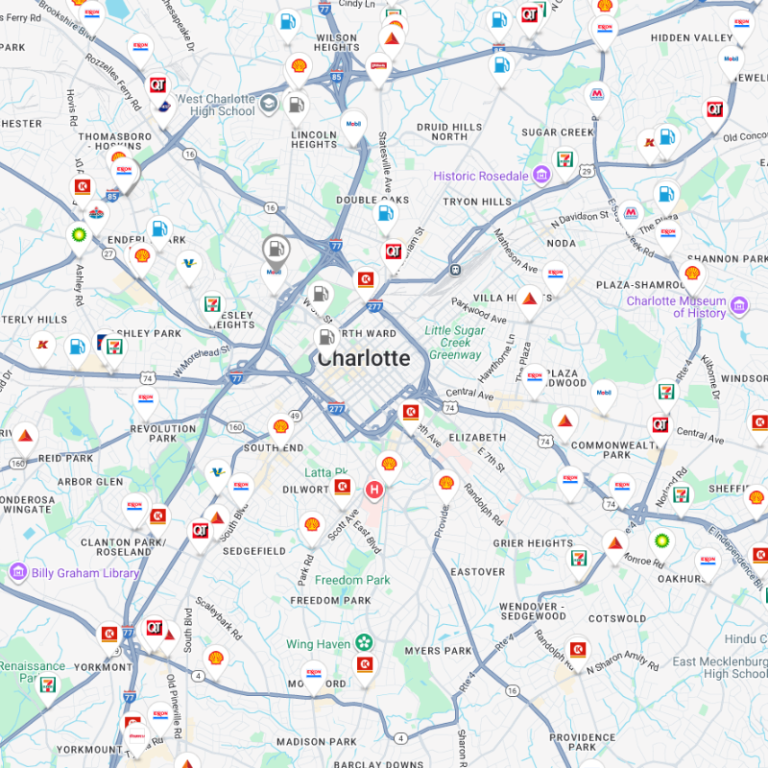Everyone’s talking about AI these days, dominating conversations across industries, but for those of us in location intelligence, AI isn’t a brand-new disruptor, it’s the next step in tools we’ve been evolving for decades -. What’s changed is the accessibility, speed, and scope of what’s now possible.
As retail, restaurant, and healthcare businesses face increasing pressure to make faster, more accurate location decisions, driven by rising costs of opening new locations and shrinking inventory of quality real estate – AI is emerging as the ultimate force multiplier.
But let’s be clear about what we’re really talking about: AI as an augmenter of human intelligence, not a replacement for it.
The reality check: What AI won’t do
Before we get to the exciting part, let’s address the elephant in the room. AI will not be making your site selection decisions for you – at least not the significant ones.
The capital-intensive nature of retail expansion, restaurant openings, or fuel station development requires multiple layers of human verification and expertise. The micro-local characteristics that make one corner superior to another – the subtle traffic patterns, demographic nuances, or competitive dynamics – these require years of field experience that can’t be easily programmed into any model.
If you’re in the business of market strategy, AI’s not here to take your job, it’s here to make it way easier and more impactful.
AI as your digital location scout
The most immediate and practical application of AI in location intelligence is as a digital assistant – think of it as having an incredibly fast, knowledgeable research associate who never sleeps and can process vast amounts of data in seconds.
Imagine you’re exploring a new market entry. Instead of spending hours researching and cross-referencing data sources, you can simply ask: “Show me the busiest retail centers in Austin” or “What are the demographic characteristics of high-performing gas stations in suburban Phoenix?” Your AI assistant instantly provides mapped results, saving hours of desk-based research.
This isn’t about replacing the rigorous, data-driven analysis that goes into location decisions. It’s about eliminating the time-consuming preliminary research that typically happens before the real analysis begins.
Accelerating ‘what if’ scenarios
One of AI’s most powerful applications in location intelligence is scenario modeling. While predictive modeling isn’t new, AI dramatically accelerates the process of testing different assumptions around revenue thresholds and cannibalization.
Need to understand how a store you have under LOI will affect the rest of the market? Want to model the impact of changing your sister store distance criteria? AI can rapidly generate multiple scenarios, allowing analysts to explore a much wider range of possibilities in the same timeframe.
That kind of speed means you can test more ideas, explore more angles, and build smarter strategies before making significant investment decisions.
The automation of analysis: Making expertise scalable
Here’s where AI becomes truly transformative for location intelligence: automating the translation of complex analytical outputs into clear, actionable insights.
Consider the traditional process when a franchisor runs a predictive model for a potential franchisee location. An analyst reviews the forecast, examines the contributing factors, and then creates a detailed explanation of why a site received its particular rating and ultimately won’t be approved. This process can take hours for each location evaluation.
AI can now generate these explanations instantly. Within seconds of running a forecast, a comprehensive summary explaining why a location qualified or didn’t qualify can be produced – complete with the key demographic, competitive, and market factors that drove the decision.
This isn’t replacing expertise, it’s scaling it, allowing one analyst to effectively serve many more franchise partners with the same level of detailed explanation.
What this means for your business
If you’re involved in location-based decisions, the question isn’t whether to embrace AI – it’s how quickly you can effectively integrate it into your processes. The competitive advantage will go to organizations that can leverage AI to:
- Accelerate preliminary market research
- Generate more comprehensive scenario analyses
- Scale expertise through automated insight generation
- Free up human resources for strategic, high-value activities
The businesses that successfully combine AI efficiency with human expertise will find themselves making better location decisions, faster, with greater confidence in their outcomes.
In our next piece, we’ll show you exactly how this looks in practice, with real demonstrations of AI-powered location intelligence tools in action. The future of location decision-making isn’t just theoretical – it’s here, and it’s transforming how smart businesses choose their next locations.



